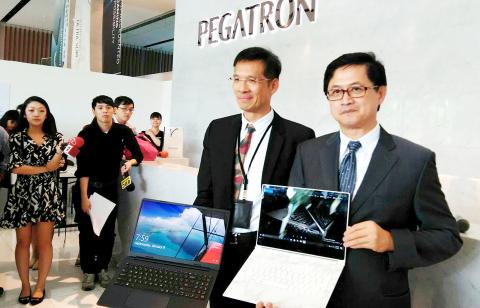Pegatron Corp (和碩), which assembles electronics from Apple Inc’s iPhones to Sony Corp’s game consoles, yesterday showcased its latest electronic car cockpit that integrates infotainment, instrument clusters and information displays as part of its efforts to expand into the automotive electronics sector.
Automotive is one of the company’s core businesses, in addition to notebooks and Internet of Things applications, Pegatron said, adding that it focuses on enhancing its technological capabilities in the three areas.
“It is becoming a trend for vehicles to be equipped with all-digital cockpits. Almost all functions will be done through displays,” Pegatron chief technology officer Steven Huang (黃中于) told a media briefing yesterday. “This is a revolution for the automotive industry.”

Photo: CNA
The electronic cockpit is the latest advance after Pegatron spent several years on the research and development of automotive electronics, he said.
The cockpit integrates a navigation system with heads-up displays, but lacks advanced driver assistance systems (ADAS), which would be supplied by automakers.
Pegatron said it is developing its own ADAS technology as well.
The cockpit is ready, but it needs to pass certification before shipment, the company said, without disclosing when the product would be released.
“We are not in hurry,” Pegatron chairman Tung Tzu-hsien (童子賢) said. “Automotive is a different sector compared with small electronics. It has longer product cycles... Some European automakers launch only one new model in seven or eight years.”
It takes time to obtain certification from automakers, Tung said, adding that the product will also match automaker’s new road maps.
Separately, Huang yesterday commented on Microsoft Corp’s newly announced cooperation with Qualcomm Inc to sell Windows 10 laptops running on Qualcomm’s mobile processor that is based on ARM Holdings PLC’s design.
All laptops on the global market are powered by Intel Corp’s processors.
Qualcomm’s processor delivers better thermal management, but its performance lags Intel’s, Tung said.
“We will spend half a year to observe the adoption” of the new model, Huang said, given Microsoft’s failure to push Windows RT in 2012.

SEEKING CLARITY: Washington should not adopt measures that create uncertainties for ‘existing semiconductor investments,’ TSMC said referring to its US$165 billion in the US Taiwan Semiconductor Manufacturing Co (TSMC, 台積電) told the US that any future tariffs on Taiwanese semiconductors could reduce demand for chips and derail its pledge to increase its investment in Arizona. “New import restrictions could jeopardize current US leadership in the competitive technology industry and create uncertainties for many committed semiconductor capital projects in the US, including TSMC Arizona’s significant investment plan in Phoenix,” the chipmaker wrote in a letter to the US Department of Commerce. TSMC issued the warning in response to a solicitation for comments by the department on a possible tariff on semiconductor imports by US President Donald Trump’s

‘FAILED EXPORT CONTROLS’: Jensen Huang said that Washington should maximize the speed of AI diffusion, because not doing so would give competitors an advantage Nvidia Corp cofounder and chief executive officer Jensen Huang (黃仁勳) yesterday criticized the US government’s restrictions on exports of artificial intelligence (AI) chips to China, saying that the policy was a failure and would only spur China to accelerate AI development. The export controls gave China the spirit, motivation and government support to accelerate AI development, Huang told reporters at the Computex trade show in Taipei. The competition in China is already intense, given its strong software capabilities, extensive technology ecosystems and work efficiency, he said. “All in all, the export controls were a failure. The facts would suggest it,” he said. “The US

The government has launched a three-pronged strategy to attract local and international talent, aiming to position Taiwan as a new global hub following Nvidia Corp’s announcement that it has chosen Taipei as the site of its Taiwan headquarters. Nvidia cofounder and CEO Jensen Huang (黃仁勳) on Monday last week announced during his keynote speech at the Computex trade show in Taipei that the Nvidia Constellation, the company’s planned Taiwan headquarters, would be located in the Beitou-Shilin Technology Park (北投士林科技園區) in Taipei. Huang’s decision to establish a base in Taiwan is “primarily due to Taiwan’s talent pool and its strength in the semiconductor

French President Emmanuel Macron has expressed gratitude to Hon Hai Precision Industry Co (鴻海精密) for its plan to invest approximately 250 million euros (US$278 million) in a joint venture in France focused on the semiconductor and space industries. On his official X account on Tuesday, Macron thanked Hon Hai, also known globally as Foxconn Technology Group (富士康科技集團), for its investment projects announced at Choose France, a flagship economic summit held on Monday to attract foreign investment. In the post, Macron included a GIF displaying the national flag of the Republic of China (Taiwan), as he did for other foreign investors, including China-based